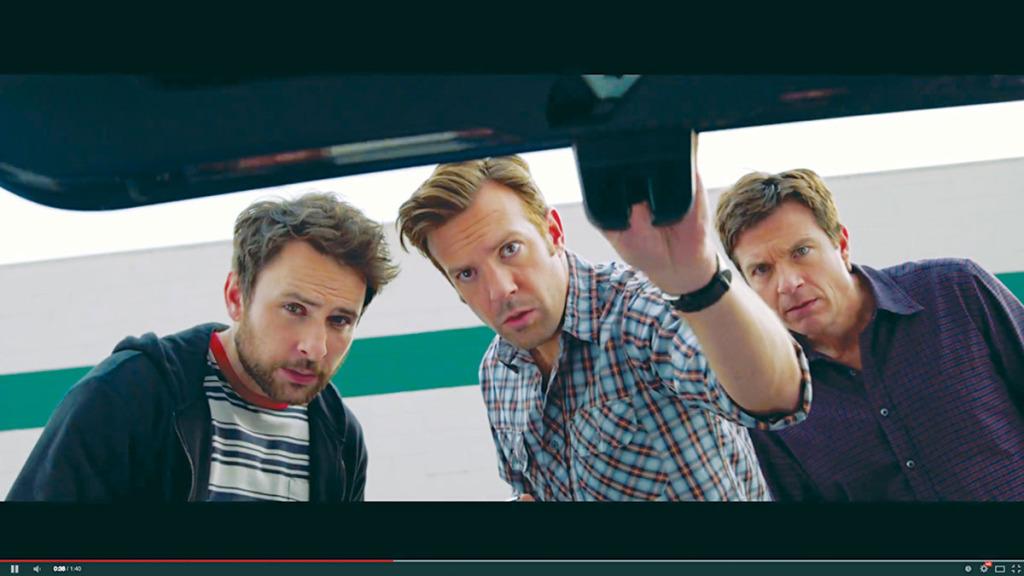Kurt (Jason Sudeikis) is standing in a shower during a morning news show in an attempt to show off the prowess of Nick (Jason Bateman), Dale (Charlie Day) and his new invention, the Shower Buddy, an invention to make showering fun and easier, like going to a car wash. Unfortunately, Dale has to pump part of the contraption to get it started, and the shadow looks eerily like a sex scene. Thus begins the crude humor that defines “Horrible Bosses 2.”
Nick, Kurt and Dale are now trying to be their own bosses. They come up with the Shower Buddy, which is similar to the wand that does all the cleaning options in a car wash, except the Shower Buddy does all the tasks for a person taking a shower, like shampoo, conditioner and soap. A ruthless businessman named Burt Hansen (Christoph Waltz) told them he would buy a substantial number of units, so the trio create their factory and make all the units. Unfortunately, Hansen backs out on his deal and that leaves Nick, Kurt and Dale in an enormous hole of debt. To get their money back, Nick, Kurt and Dale decide to kidnap Hansen’s son, Rex (Chris Pine). Things go awry, and the men must save their own skins.
“Horrible Bosses” succeeded in exceeding expectations. In “Horrible Bosses,” there was more screen time devoted to individual characters and their bosses before the second half where they come together to try and kill them. The overall structure in the first one was surprisingly better. The type of comedy in the sequel is similar to the first film, with jokes about sex, drugs and crime. However, the original had the bonus of a strong supporting cast and story.
In “Horrible Bosses 2,” characters are not as fresh. Jennifer Aniston and Kevin Spacey reprise their roles as Julia Harris and David Harkin, respectively. They use material that feels dull and overused. For instance, Aniston’s character, Dr. Julia Harris, is now in a sex addiction group, and her dialogue is compiled so she can say the raunchiest things imaginable. There is no substance, just cheap, gross gags.
There are points in the movie where the characters venture into new territory, especially considering the addition of Hansen and Rex. Rex adds a new dynamic to the group, and a different level of craziness. At one point he starts “fight clubbing” himself, beating himself up, so the cops think Nick, Kurt and Dale did it. Pine shines with the comedic material, and his type of villain contrasts with Hansen.
Waltz is not given much material to work with, and instead he plays the stereotypical, ruthless businessman. He squashes the hopes of the Shower Buddy American dream with very little effort. He is defined by his lack of empathy and how he values money over his son. However, since he is on the screen for so little time, there are not many character traits he can show.
When Sudeikis, Day and Bateman are the only ones on screen, they elevate the material. Each man takes an over-the-top character trait and exaggerates it. The best parts of the movie are when they are arguing and discussing the bad decisions they are making. A particularly funny running joke shows the men arguing over their code names on walkie-talkies. They do not want to use their real names just in case someone is listening on the same wavelength, yet, they all end up saying their real names at one point. Day and Sudeikis are the little kids Bateman has to wrangle the entire movie. Bateman plays his straight-man persona excellently, and the exasperation is evident on his face, but he is eventually brought down to Kurt and Dale’s level and uses a code name.
Surprisingly, “Horrible Bosses 2” has a couple of twists at the end to keep the audience guessing. The humor is hit and miss, with some jokes coming off as too crude and tasteless. It is in the moments that use the dynamic between Sudeikis, Day and Bateman where the movie is the most successful.




















